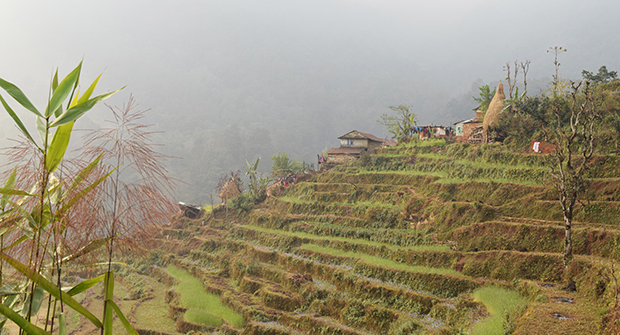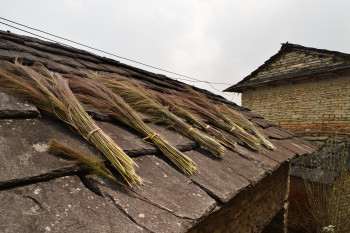 Broom grass torkas för tillverkning av sopkvastar.
Broom grass torkas för tillverkning av sopkvastar.Foto: Annika Borg
The village of Sunar Gaun, Dam Dame lies on a hillside at an altitude of around 1400 meters, and around 15 km from Pokhara city in Nepal. Around the small village houses the terraces are covering the steep hillside slopes. A road, built some ten years ago, is winding up the hill past the village, where there only was a walking track Before.
Here lives a group of farmers, who are amongst the poorest in the area. The six families living here are mostly dependent on their small farms for their livelihood, and what money they can make from sale of brooms (made from flower heads of broom grass, (Thysanolaena maxima), and daily labour wages.
The village has suffered from loss of soil fertility, due to the heavy rain that leaches away lots of the nitrogen and causes erosion. The average annual precipitation is 3355 mm and the highest precipitation from this area is recorded 5000 mm per year – i.e. the highest rate of rainfall in the whole country. The harvest of livestock fodder and firewood has removed the tree cover that once protected the soil against erosion.
The area has an open grazing system and most of the farmers do not like to raise their cattle in stall fed system. So the traditional system of keeping the livestock outdoors didn´t allow the farmers to collect the manure for use as fertilizer. The IUCN Ecosystem based Adaptation (EbA) project has tried to improve the soil fertility and moisture content through the integrated soil nutrient management. This was done through different activities – livestock shed improvement, management of Farm Yard Manure (FYM), organic farming, biogas establishment, plantation of broom grass and other forage and fodder species.
The livestock sheds have been improved with new floors from locally available stones and mud. In this way the farmers can collect the manure and urine in a systematic manner. Through a biogas digester the farmers can make biogas for cooking, and aren´t dependent on firewood – which means less deforestation. The new system has also contributed to protection of the soil. The slurry that is the waste in the biogas digester is used for farming in the fields, and the urine collected is used to improve the yield of vegetables grown in the small gardens around the houses.
The IUCN EbA project implemented different ”no regret EbA measures” such as ecosystem restoration, water source conservation and restoration, integrated farm soil management, land rehabilitation, conservation farming and livestock management and some livelihood diversification activities. This ultimately supports the goal to reduce landslides and siltation in the Phewa Lake, which is the heart of the tourist attraction in Pokhara.
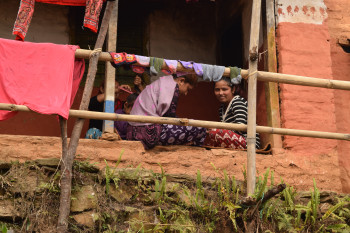
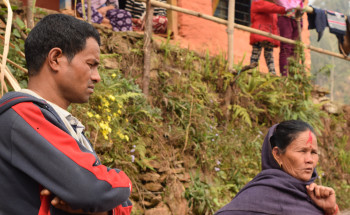 Bybor berättar om sin situation när en delegation från IUCN besöker deras by.
Bybor berättar om sin situation när en delegation från IUCN besöker deras by.Foto: Annika Borg
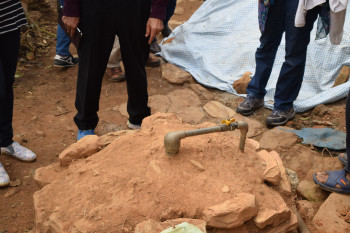 En liten biogasanläggning i anslutning till djurens uthus har betytt mycket för byn.
En liten biogasanläggning i anslutning till djurens uthus har betytt mycket för byn.Foto: Annika Borg

